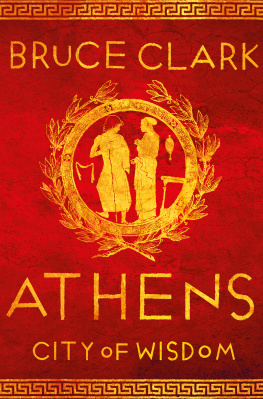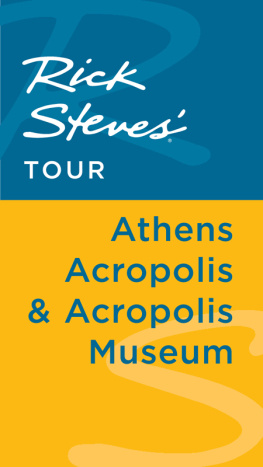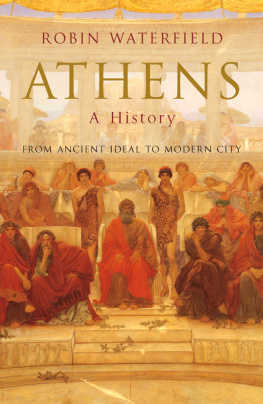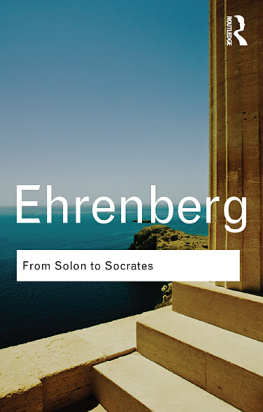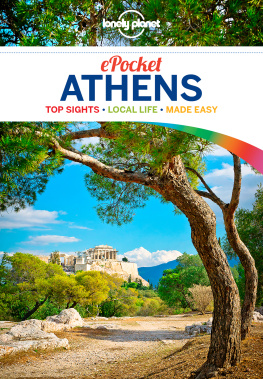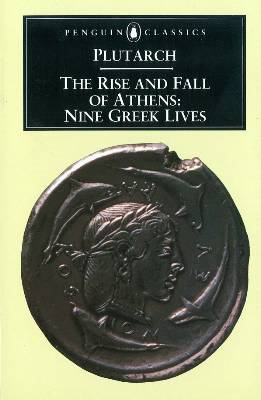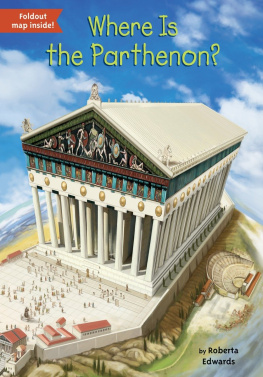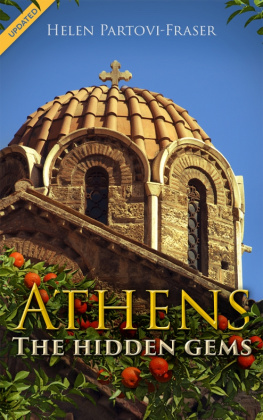ATHENS
CITY OF WISDOM
ATHENS
CITY OF WISDOM
BRUCE CLARK
AN APOLLO BOOK
www.headofzeus.com
First published in the UK by Head of Zeus in 2021
An Apollo book
Copyright Bruce Clark, 2021
The moral right of Bruce Clark to be identified as the author of this work has been asserted in accordance with the Copyright, Designs and Patents Act of 1988.
All rights reserved. No part of this publication may be reproduced, stored in a retrieval system, or transmitted in any form or by any means, electronic, mechanical, photocopying, recording, or otherwise, without the prior permission of both the copyright owner and the above publisher of this book.
A catalogue record for this book is available from the British Library.
ISBN (HB): 9781788548144
ISBN (E): 9781788548137
Head of Zeus Ltd
58 Hardwick Street
London EC1R 4RG
www.headofzeus.com
In fond memory of some kind Athenian friends who guided me, as a teenager, on my first steps through the city including John Leatham, Mary Fotiadi and Cristin Carandell.
CONTENTS

The rendering in English of Greek places and persons is a minefield, given that for almost any name there can be up to half-a-dozen valid possibilities. I have used the standard English rendering (which is often a somewhat Latinized version) where that is very familiar, for example, Aeschylus, Pericles, Marathon. For less familiar people and places, I have transliterated in a more literal way, for example, Lykourgos, Xanthippos, Kifisia, Fyli. Alas, it is not humanly possible to be completely consistent.
Rocks that Matter
When students in the Western world are introduced to global history, they are often told that civilization owes a particular debt to events which unfolded on two stony citadels in different parts of the eastern Mediterranean. At least physically, the two places have something in common. Both these natural formations surge dramatically out of the ground, rising to outcrops which are naturally flattish and can be made flatter still. Both have been defensive strongholds, blessed with secure water supplies, though neither in the end proved unassailable. Despite these common features, their significance has been understood in very different ways.
One is Jerusalems Temple Mount, seen as the home of monotheism, and the other is the Acropolis of Athens, whose monuments are revered as a testament to human reason, skill and freedom. This book will be about one of those citadels, and the civilization that arose around it, although currents flowing from the two places did eventually swirl together.
The plaza which dominates the Old City of Jerusalem is revered, of course, for its spiritual history, as a locus of carefully orchestrated encounter between man and a single Deity. The other citadel is associated by most modern admirers with a different story, one that focuses more on earthly achievement. The shimmering marble structures which crown the Acropolis are admired as the most tangible survival of a society where mankind, so to speak, stood on its own feet. In todays understanding of things, ancient Athens compels respect as a cradle of humanism.
This was a society, it seems, where instead of bowing meekly before one or more gods, brilliant minds engaged in deliberation whose outcome was genuinely open. A community where weighty matters of war and peace, as well as routine daily administration, were tackled through the interplay of well-trained intellects that knew how to assess arguments and draw conclusions. With approval, modern historians note what seems like an emerging, secular sophistication in the Athenians understanding of their own collective story: not as a capricious game acted out by divine powers, but rather as an interplay of human motives which may be complex but can ultimately be dissected and described. Contemporary admirers also love the fact that Athens had well-crafted laws and institutions whose very purpose was to transcend the personal vicissitudes of clever, ambitious individuals, and the whims of jealous deities, and instead serve the broad public interest in a consistent way. Days before handing over the presidency to Donald Trump in 2016, Barack Obama visited the Acropolis and observed warmly that it was here twenty-five centuries ago, in the rocky hills of this city, that a new idea emerged. The name of that idea, he enthused, was demokratia in other words a system where kratos , the power to rule, came from the demos , the people.
As a description of the Athenian golden age and its ideals, all that is more true than false. But it also leaves out an important aspect of the citys legacy: ancient Athens never ceased to be an intensely spiritual place, a space where the transcendental seemed ever-present. True enough, the modern mind fixates on the human achievements of ancient Athens. It marvels at the logistical and practical skill that was required to haul so much shining marble up a steep hill and then fashion the glistening white rock into structures that enchant us with a false appearance of symmetry. Like medieval cathedrals, these monuments required a huge input of human brain-power, applied to engineering, geometry and the properties of stone. But just as the modern mind finds it hard to imagine the spiritual ideals which underpinned those cathedrals, it also underestimates the spiritual aspect of the Acropolis.
In fact, neither ancient Athens as a whole, nor its greatest monuments, was a secular space in the sense we now understand. The finest monument of all, the Parthenon, was not a parliament building but a temple, in the particular sense that the ancient Greeks gave the word: not a place to pray or sacrifice (that happened outdoors, nearby) but a building that housed a sacred statue whose creation and installation was in itself an act of piety.
The whole complex erected on the Acropolis was a giant statement of homage and thanks to Athena, the citys protectress, and to other deities. It was not just the structures on top of the citadel that were invested with holiness. The geological formation was known as the Hiera Brakhos , the sacred rock. Democratic debates happened not on the Acropolis but on a nearby hill, the Pnyx, which attracts too few visitors. Moreover, a remarkably high proportion of the democratic assemblys business consisted of micromanaging public religious practices: which sacrifices should be made to which gods and where.
Whatever their penchant for rational investigation, the ancient Athenians resembled and often outdid their fellow Hellenes in having an intense feeling for the numinous. That is what makes their story so interesting and elusive. For them it came naturally to think of certain features of the natural world, from springs to entire mountains, as liminal spots, locations where mankind stood at the boundary between everyday reality and some transcendent world. The best Athenian citizens certainly did have powerful, reasoning, self-critical minds, but they also had a highly charged sense of the spiritual.
It is not hard to see why the Acropolis was always perceived as one intensely liminal place, by virtue of its form and location. It overlooks a well-watered plain, surrounded by four great mountains as well as smaller hills. In ancient times, all these peaks abounded in beautiful vegetation. Mount Hymettus, to the east, was prized for its honey, Mount Pentelikon for its exceptionally pure marble. The sea sparkles at a safe distance: close enough to be convenient, but far enough away to avoid the city becoming a sitting target for maritime invaders. A series of natural, defensible harbours can be made out on the horizon. It seems entirely natural to give thanks for the very existence of a such a magnificent place.

